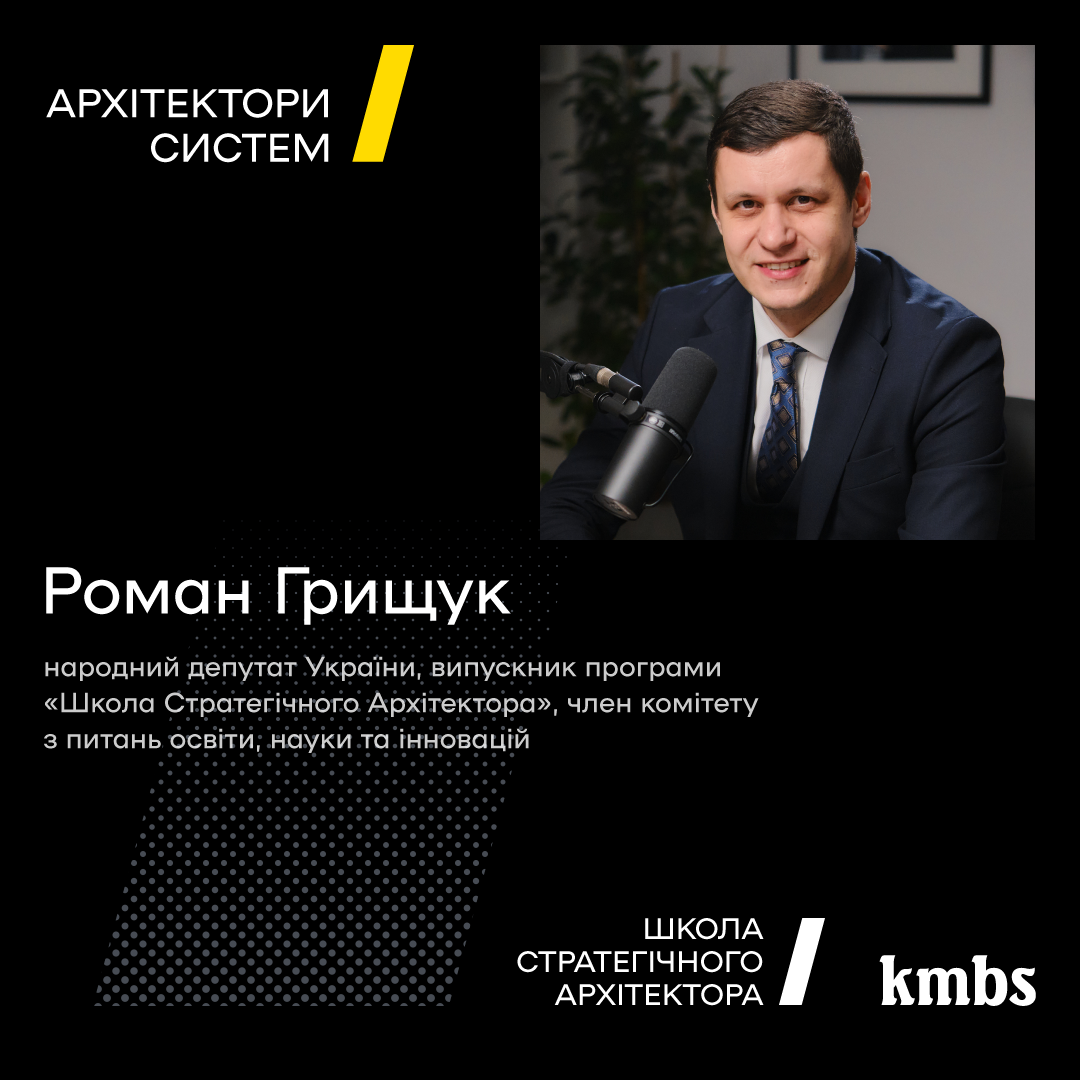Learn first
KMBS latest news in real time

For the latest KMBS events and news, visit KMBS Live at the top right corner of the screen
Open kmbs live 10.08.2022
10.08.2022 5453
5453 0min
0minYou can hear opposite opinions regarding MBA education: "if I am the owner of a business, why should I still study" "to become a modern manager, there is nowhere without an MBA education." Who is right? And what exactly does an MBA education entail?
Olena Zhyltsova: Neither the first nor the second are right. Of course, some are sure that they have already studied everything, learned about everything, have the CEO position, or are the founder of a business, and therefore have achieved everything. But today, the world is changing dramatically and is constantly being updated. For example, the average lifespan of companies in the S&P 500 used to be 67 years, but now it's 15.
The same thing happens on a personal level. According to the World Economic Forum, the "half-life" of a skill or competency is now five years. So, after five years, what you own, how you work, is half devalued. Of course, it all depends on what skill it is: technological ones become obsolete faster, management, strategic capabilities — longer. But the most important thing is that if you once took the height, it does not guarantee the right to success on a personal or organizational level.
So, it would help if you reinvented yourself constantly. Invent a portfolio of your abilities, views, beliefs, etc. Is it possible to do this only with the help of an MBA? Of course not. This should be done in a very different way.
Now let's turn to the second cohort, which says that without an MBA education, nothing will work; with it, all roads will be green-lighted. Global statistics state that 93% of people who apply for the position of top managers have an MBA degree. This means that they compete with each other. Some are stronger (thanks, in particular, for working on themselves), and some lag even with this status. So, it's about relentless work. And so I think that neither of the two opinions is correct.
And which areas of MBA education are currently the most popular and in demand?
O.Zh.: MBA education is changing just like everything else. Recently, AMBA, the international association of MBA program providers, asked the deans of leading business schools whether the MBA would change. 77% answered that in 10 years MBA would change fundamentally. It will not be just a redesign, an update, or an improvement, but a fundamental product change.
Now it is difficult to say precisely where we are going. But I can identify specific trends. There are three large groups: topics, formats, and participants.
Institutional leaders or owners expect the curriculum to be more closely aligned with what business is most in touch with and what is "hot" for them: innovation management, sustainable development, circular economy, global supply chain challenges, ethical leadership, etc.
There is also a demand for business schools to become more "soft." MBA graduates from all over the world demonstrate a good level of "hard" abilities (knowledge of finance, accounting, calculations, etc.), but sometimes the humanitarian component "sags."
Now about the formats. A full-time MBA used to be popular — the manager or owner took a two-year sabbatical to rethink himself. Currently, a part-time MBA, when you combine studies and work in a professional role, is gaining increasing popularity worldwide. This allows not to fall out of the business context for two years and to immediately implement what the participants learn about at the business school.
Another trend related to formats: two years ago, when the pandemic started, everyone thought that going online was a loss of quality. And now, it is already becoming a "hygienic" option, available by default. Schools today should offer blended learning, where you can participate online and offline. After all, it allows managers to learn even while traveling on business trips.
And as for the participants, here I will note one trend: the percentage of women in MBA programs is growing more and more. Today it is 33%, and earlier it was only 20%. This means diversity and inclusion are more than just buzzwords. Women's leadership continues to evolve.
How does technology affect changes in MBA education?
O.Zh.: Technology now affects everything, and MBA is no exception. First, classic MBA courses need to be updated by the changes that technology brings to the subject taught in the course. For example, if you're teaching global finance, you can't help but work with participants on how technology is changing the global financial and banking systems. If you teach a Human Capital course like I do, you can't help but talk about how human + machine will work, i.e., integrated teams of people and devices, and how a manager can deal with it. Therefore, each teacher monitors the technology in their field of research and updates their course.
Secondly, there is a belief that separate courses dedicated to analytics and working with technologies should appear. It has become an essential skill for us, like reading, writing, and mathematics. Even several thought leaders in business education believe that programming at some fundamental level should be included in all programs.
As what we teach changes, so does how we teach. And this is because we are starting to use various technologies for training. Among other things, they make it possible to study the "learning behavior" of the participants. And adjust courses based on this data. This makes learning more personalized, effective, and asynchronous. For example, today's technology can help a teacher partially determine the audience's reaction based on eye movements and adjust their messages live.
And, of course, if a business school wants to be on the cutting edge of technology, it can't help but incorporate it into its internal processes. This is advanced administration of the entire range of activities: from the application process to interaction with the alum community.
So, the transition to online does not prevent effective studying in the MBA program because modern technologies help to establish communication.
O.Zh.: Learning now is constantly interactive. And the teacher in it is no longer the only source of knowledge to which people come to "get drunk." Today, learning is an interactive interaction of participants (we call them participants, not students, to emphasize their subjectivity). It's about participation and co-creating a learning space. And sometimes, the teacher can learn more from the participants than from him.
Achieving this online takes some skill. Simply transferring a course you previously studied offline to an online system will not work. But many tools can help. Of course, this is a new challenge for teachers, but the truth is that you can teach online without losing quality.
There is a war in Ukraine, and specific business representatives who want to study at MBA programs say: "when the war ends, then I will leave." How can you answer them?
O.Zh.: Of course, this is a difficult question. But the Executive MBA program, which I have the honor to lead at kmbs, did not stop. Our groups continue to learn, and I take my hat off these people. Under challenging circumstances, both personal and organizational, they continue. And I want to thank them for doing it together.
I also want to mention Clive Lewis, the author of The Chronicles of Narnia. He graduated from Oxford University and was a veteran of the First World War. In 1939, with the beginning of the Second World War, Oxford had a certain turbulent mood. The students asked themselves: should they continue? Is it even ethical to think of some formulas when the world is at war, and they see what is happening on the streets of Warsaw? That's when Oxford invited its graduate Lewis to give a speech.
It happened on October 22, 1939, and was a fantastic speech. Her central thesis is that this is not true, as if there is some "normal life." We are always teetering on the edge of a precipice, and we always have a myriad of different reasons why "not now." Diseases, viruses, pandemics — if translated to our context. If humanity were to stop its intellectual and aesthetic activity whenever these reasons exist, we would still have achieved nothing in our civilizational development.
Humanity has always solved mathematical theorems in besieged cities, conducted metaphysical debates in convicts' cells, sharpened their thoughts on the scaffold, etc. And I agree with that. Don't wait for a "good time" — it won't happen.
And I also want to say that it is already quite difficult for managers today. Shortly, there will be even more challenges due to the consequences of the war, a significant loss of economic potential, human potential, etc. At this time, stopping investment — particularly in your development — is like stopping the clock from saving time.
Whether we like it or not, we must solve all these problems. And we should be ready for that. I am convinced that top-level managers need to go to an open educational space, to groups with other CEOs, where they can discuss and look for solutions. After all, only systemic, global solutions will help to overcome these challenges.
What exactly can top managers learn in MBA programs?
O.Zh.: Within our Executive MBA, we always start with ourselves. We discuss our strategies because a person's most significant limitation is often himself. And the most extensive glass ceiling of the business is, in fact, its first person.
The core level of the program is new-age strategies. What is the process now, why is a strategy not a plan, and why it's a myth that you can't strategize in turbulent times? We are talking about business models and ecosystems. And, of course, we understand how to implement strategies. After all, a good manager not only knows how to write a good concept but also how to implement it in an organizational context.
All of this applies to the Executive MBA program. We also have the Presidents' MBA, a program for business owners, and the MBAF, a program for CFOs and analysts.
If a person decides whether he needs an MBA education or not, what should be the main argument for him?
O.Zh.: Sometimes, participants apply for the program and do not fully understand why they need it. Sometimes there is a kind of "tribute to fashion." We recommend asking yourself the question: why do I need this? Actually, this is why we start with personal strategies. At this level, you can meet your expectations from the program.
Of course, there will not be a full match between reality and expectations. Generally, you get more in some things and completely different in others. But it is still much better when you come to study with a particular awareness of your "why."
There is a flipped learning approach. When you prepare a little before studying, you write your list of questions. It has been proven that the efficiency is higher in this case. Because we want to create maximum value for the participant, we always ask them to think. However, then this request may change several times in the program.
So, I would recommend to those who are thinking of studying to read, think, look, in particular, read case studies of graduates.
And how do you choose an MBA program? After all, there are more than 2.5 thousand in the world.
O.Zh.: Yes, there are many of them, and they differ according to very different criteria: the language of teaching, on which platforms or on which campuses the learning is conducted, the teaching schedule, the number of modules, etc. On the other hand, the world now has such a trend that more and more participants choose local programs with a global concept. They decide to study in schools in their countries but conduct international modules, involve foreign professors, and think and act globally. It seems to me that this is an effective solution.
And what are the practical results of MBA studies? For example, find a better job, significantly increase the salary?
OJ: Basically, an MBA is a Master of Business Administration. There are two layers of these programs in the world. The first is early career entry programs, right after undergraduate. And the second is programs like the ones we have at kmbs, which are programs for mature members. Usually, for them, it is a second education, a significant choice.
What do such programs directly affect? They affect your professional and personal "delta" (the difference between how you entered the program and leave). The portfolio of capabilities, the way of thinking, the "optics," i.e., what one can see, networking, and the understanding of oneself and one's team will change enormously.
As for salary, according to statistics, 77% of people earn more after an MBA. But there is an apt metaphor — the "ice cream lake." Suppose you look at how the number of drownings in the lake increases and decreases, and the graph of ice cream consumption goes synchronously. That is, there is a correlation here, although, in reality, there is no cause-and-effect relationship. A third factor is a summer; in the summer, people swim more and eat more ice cream.
So it is with this 77% of higher salaries. We do not know in the end whether it is the merit of the MBA or simply that people with ambitions and willingness to develop and work on themselves already come to us. And they owe their success to this.
Full recording of the broadcast at the link: https://podcasts.nv.ua/episode/14001.html










